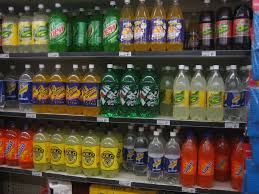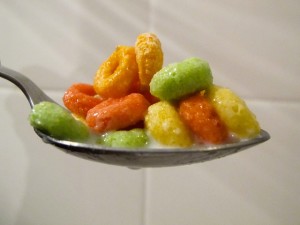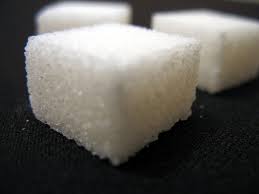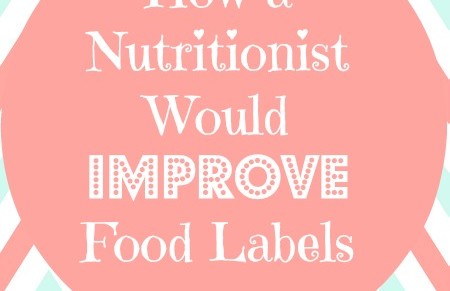You would never think that something as simple as a nutrition label would be such a politicized and often misleading piece of information. Of course in my ideal world, we would all be eating only whole, unprocessed foods that do not have a label. However, in the meantime I would like for consumers to be able to read and understand nutrition labels and not to be misled by questionable and sometimes even downright false claims.
It is your right to know what you are buying, eating, and feeding your family. Don’t let big food corporations trick you into believing otherwise or lead you to believe they have your best interests at heart. It shouldn’t be too much to ask for food companies to be required, to be honest. After all, they have nothing to hide, right?
Here are my top five changes I would like to make nutrition labels to help the public to make healthier and informed choices.

Label GMOs
Ultimately, whether or not you consume genetically modified foods should be your choice alone. Companies should be required to disclose if their products contain GMOs as it is your right to know. There is plenty of evidence as to why we should remain skeptical and cautious of GMOs, but of course, industry interests are deemed more important than public health by governing bodies due to corporate lobbying and significant conflict of interest.
The only way to be certain that a product does not contain GMOs is to look for the Non-GMO Project butterfly logo on the package. You can check out their awesome list of verified non-GMO products here.
Remove All Misleading Claims and Memberships
Food companies are notorious for claiming “no trans fats”, “low carb”, “no added sugar”, and “a good source of energy” among others on their packages, but most of these claims are either false or mean nothing at all. Many products that advertise themselves as being “trans-fat-free” contain trans fats (more on that later). That low carb/no added sugar yogurt, cookie, or protein bar? Read the ingredients. It most likely contains artificial sweeteners such as aspartame or sugar alcohols such as sorbitol or xylitol. I’m pretty sure that no one wants to experience a migraine or case of explosive diarrhea after eating their so-called healthy snack.
A “good source of energy” simply means that the product contains calories. That’s it. By the same standard, a can of pop, chocolate hazelnut spread, or a chocolate bar is also good sources of energy as they contain a lot of empty calories in the form of sugar. Definitely not the kind of energy we need to fuel our day. What is important is the QUALITY of those calories as that is far more telling of the kind of energy food will provide.
Canadians are probably aware of the now disbanded Health Check program, or at least have seen the Health Check logo on food packages in the past. The Health Check program was essentially a list of foods approved and promoted as being supposedly heart healthy by the Heart and Stroke Foundation. Health Check approved foods included such things as Kraft Dinner (Kraft Mac & Cheese in the US), Diet Pepsi, Miracle Whip, and margarine as “heart healthy” food choices. Let me be clear; there is nothing “heart healthy” about refined carbs, artificial sweeteners, or processed vegetable oils.

Image: Pixabay
Single Serving Packages Should Contain Only One Serving
Beverages and snacks are notorious for this. Many “single serving” convenience foods contain anywhere from two to four servings, as listed on the nutrition label. If someone is just scanning at the number of calories when reading a nutrition label, they might miss that their “80 calorie” snack is actually 240 calories when they eat or drink the entire package or bottle.
Portion control is important, especially when we indulge in a treat. But the size of the product should be the same as the labeled suggested serving size.
Percentage of Daily Intake of Sugar and Full Disclosure of Trans Fats
The World Health Organization has recommended that no more than a maximum of 10% of our daily calories should come from added sugar. But are nutrition labels required to disclose the percentage of sugar the food contains based on a 2,000 calorie diet? No. I think that if people saw that a product contained 30%, 70%, or even 110% of their daily sugar maximum they might be a little less inclined to eat such food, at least on a regular basis. It might even persuade food manufacturers to start making healthier products with healthier ingredients that people will want to buy. Just remember, every 5 grams of sugar is equal to 1 teaspoon or 1 cube of sugar. It adds up pretty quickly.

Image: Pixabay
Trans fat is liquid vegetable oil that has added hydrogen ions, a nickel catalyst, and processed under extreme heat and pressure in order to create a solid, long-lasting, shelf stable fat. This synthetic fat has been clearly shown to increase the risk of cardiovascular disease and is associated with a variety of other diseases and conditions.
There is absolutely no denying that trans fats are really bad for us. But that doesn’t stop food companies from advertising their products as trans fat-free when they are not. In Canada and the US companies are allowed to claim that a product is trans fat-free if it contains 0.49g of trans fat per serving or less. Companies often get around this not by eliminating or even reducing the trans fat content of their products, but by shrinking the serving size down to a level where they can round down and claim not to contain trans fats.
So how do you know if a product contains these deadly fats? Look in the ingredient list. If you see “hydrogenated” or “partially hydrogenated” anywhere in the ingredients the product contains trans fat. It can also commonly be hidden in the ingredients as vegetable shortening, shortening, or margarine. If a food contains any of these ingredients, don’t eat it.

Image: Pixabay
Surgeon General Warnings
Yeah, you read that right. I do believe there should be Surgeon General warnings on foods that are harmful to our health. Soda, junk food, high fructose corn syrup, aspartame, MSG, refined carbs, margarine, and refined vegetable oils have been found to be very risky foods to be consuming on a regular basis. We put warnings on cigarettes, so why not also provide adequate warnings on foods that we know can increase the risk of heart disease, stroke, cancer, diabetes, obesity and a whole host of other diseases? Public health should always be more important than corporate interests.
What do you think about my proposed nutrition label changes? How would you change labels to make them easier for you to use? Let me know in the comments below and on Facebook, Instagram, and Twitter!
—
Love what you are reading? Stay in the loop and never miss a recipe; get the FREE Nutritionista ezine for free expert tips, success strategies, delicious healthy recipes and VIP offers and get Erin’s exclusive guide of the Top Ten Foods to Banish From Your Kitchen ($24.99 value) absolutely free! Get ready to nourish yourself sexy!
You might also like Which is Healthier, Butter or Margarine?
© 2015 Nutritionista. Erin Luyendyk, RHN. All rights reserved.
All material found on www.thenutritionista.ca is intended as general educational material only and should not be considered medical or nutritional advice. It is not intended to diagnose, treat, or cure any medical condition and has not been evaluated by the FDA. Please consult with your personal physician before implementing any health, nutrition, supplement or exercise program to ensure its safety and suitability for your specific individual situation



